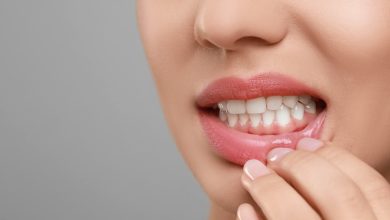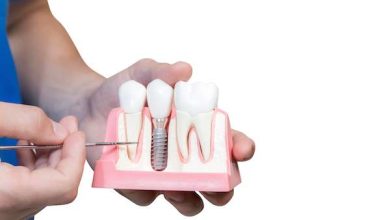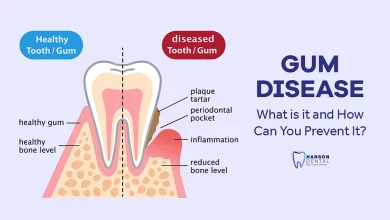Why Do My Gums Bleed After Dental Cleaning?

Your gums may bleed after dental cleaning due to the removal of plaque and tartar. Bleeding gums are a common occurrence after a dental cleaning.
This can be attributed to the removal of plaque and tartar from your teeth and gums. While it might be alarming, it is actually a sign that the cleaning was effective in getting rid of harmful substances that can lead to gum disease and other oral health issues.
Bleeding gums can also be a result of your gums being sensitive or inflamed, which can be caused by improper brushing and flossing techniques or underlying health conditions such as gingivitis or periodontitis. It’s important to address bleeding gums with your dentist as they can provide guidance on improving your oral hygiene routine and treating any underlying issues.

Credit: www.aboutdentalcare.com
**understanding Gum Bleeding After Dental Cleaning**
html
Paying attention to your oral health is crucial for overall well-being. Gum bleeding after dental cleaning is a common concern for many individuals. It is important to understand the causes of gum bleeding, the impact it can have on oral health, and the significance of maintaining healthy gums.
Causes Of Gum Bleeding During Dental Cleaning
Gum bleeding during dental cleaning can stem from several factors:
| Poor oral hygiene |
| Gingivitis or periodontal disease |
| Trauma or injury to the gums |
| Medication side effects |
Importance Of Maintaining Healthy Gums
Maintaining healthy gums is crucial because:
- Healthy gums act as a protective barrier
- They help anchor the teeth in place
- Prevent oral diseases, such as gum infection
- Positive impact on overall health
Effect Of Gum Bleeding On Oral Health
Ignoring gum bleeding can lead to serious oral health issues:
- Progression of gum disease
- Increased risk of tooth loss
- Bad breath
- Difficulty in eating and speaking
Addressing gum bleeding after dental cleaning requires consulting with your dentist or periodontist. They can provide guidance, recommend appropriate treatment, and help you maintain excellent oral health.
**factors Contributing To Gum Bleeding After Dental Cleaning**
Factors Contributing to Gum Bleeding After Dental Cleaning
Gum bleeding after dental cleaning can be caused by a variety of factors. One major factor is gum diseases and their impact on bleeding gums. When left untreated, gum diseases such as gingivitis and periodontitis can lead to inflammation and bleeding of the gums.
Lack of oral hygiene also plays a role in gum bleeding. Failure to maintain proper oral hygiene, including regular brushing and flossing, can result in plaque buildup. This buildup can irritate the gums and cause them to bleed.
Medications can also contribute to bleeding gums. Certain medications, such as blood thinners and some antiplatelet drugs, can interfere with the clotting process and increase the likelihood of gum bleeding.
**preventive Measures To Reduce Gum Bleeding Post Dental Cleaning**
Regular dental check-ups are important for maintaining oral health. During a dental cleaning, it is not uncommon for gums to bleed. This could be due to a number of factors, including improper oral hygiene techniques, using the wrong tools, or certain nutritional deficiencies.
When it comes to oral hygiene, it is crucial to use the right techniques and tools. Brushing your teeth twice a day and flossing daily can help remove plaque and food particles, reducing the risk of gum bleeding. Additionally, using a soft-bristled toothbrush and replacing it every three to four months is recommended.
Nutritional factors also play a role in gum health. A diet rich in vitamin C, vitamin A, and omega-3 fatty acids can support healthy gums. Incorporating foods such as citrus fruits, leafy greens, and fatty fish can help promote gum health.
In conclusion, taking preventive measures and maintaining proper oral hygiene techniques can help reduce gum bleeding after dental cleanings. Regular dental check-ups can detect any underlying issues and provide appropriate treatment, ensuring the overall health of your gums.
**when To Seek Professional Help**
When to Seek Professional Help
Gum bleeding after dental cleaning can be a common occurrence, but certain signs and symptoms may indicate a need for professional help. If the bleeding persists for more than a day or two, it is essential to consult a dentist. Additionally, if the bleeding is severe, accompanied by pain, or continues despite proper oral hygiene practices, immediate dental intervention is necessary.
Signs and Symptoms Requiring Dental Intervention
There are various signs and symptoms that may require dental intervention for gum bleeding. These include persistent bleeding, swollen or tender gums, loose teeth, bad breath, and receding gums. A dentist can diagnose the underlying cause of gum bleeding and provide appropriate treatment.
Role of the Dentist in Diagnosing and Treating Gum Bleeding
A dentist plays a crucial role in diagnosing and treating gum bleeding. Through a thorough examination, the dentist can identify any underlying dental issues such as gum disease, tooth decay, or oral infections that may cause the bleeding. They may recommend a deep cleaning, also known as scaling and root planing, to remove plaque and tartar buildup. Additionally, the dentist can provide guidance on maintaining proper oral hygiene and suggest appropriate treatments to address the root cause.
Treatments Available for Gum Bleeding
Several treatments are available to address gum bleeding. Depending on the underlying cause, the dentist may prescribe antibiotics, mouth rinses, or medicated gels to reduce inflammation and control infection. In some cases, surgical procedures such as gum grafts or pocket reduction surgery may be necessary to restore gum health. It is important to follow the dentist’s recommendations and maintain regular dental visits to prevent further complications.
**common Myths About Gum Bleeding After Dental Cleaning**
Common Myths About Gum Bleeding After Dental Cleaning
There are several misconceptions surrounding gum bleeding after dental cleaning, but it’s important to separate fact from fiction.
Debunking misconceptions about gum bleeding:
| Myth | Fact |
| You should stop brushing and flossing if your gums bleed. | Continuing proper oral hygiene is crucial to prevent gum disease. |
| Bleeding gums during cleaning are a sign of a problem. | Some bleeding is normal after a thorough dental cleaning. |
| Dental hygienists are causing the bleeding during cleaning. | Bleeding gums are often due to existing gum disease and not the cleaning itself. |
| Using herbal remedies can cure gum bleeding. | Herbal remedies may have potential risks and are not scientifically proven to treat gum bleeding. |
It’s essential to understand that gum bleeding can occur due to various reasons, including gum disease, improper oral hygiene, hormonal changes, and certain medications. Regular dental cleanings help remove plaque and tartar, reducing the risk of gum disease. If you experience prolonged or excessive bleeding, it’s important to consult with a dental professional to determine the underlying cause and appropriate treatment.
Frequently Asked Questions On Why Do My Gums Bleed After Dental Cleaning?
Is It Normal For Gums To Bleed After Teeth Cleaning?
Yes, it is normal for gums to bleed after teeth cleaning. This can happen because the cleaning may cause gum tissue to become irritated and bleed temporarily. It should subside after a day or two, but if it persists or worsens, you should consult your dentist.
How Long Will My Gums Bleed After A Teeth Cleaning?
Gums may bleed after a teeth cleaning for a day or two. It’s normal and usually stops on its own. Contact your dentist if the bleeding persists or worsens.
Is It Normal To Bleed During A Dental Cleaning?
It is common to experience some bleeding during a dental cleaning. This can happen due to the removal of plaque and tartar from the teeth. However, if the bleeding persists or is excessive, it may indicate gum disease and should be addressed by a dentist.
Is It Normal For Gums To Bleed During Scaling?
Yes, it is normal for gums to bleed during scaling. Scaling is a deep cleaning procedure that removes plaque and tartar from the teeth and gums. The gums may bleed because they are inflamed or due to the removal of bacteria.
This should subside after a few days with proper oral hygiene.
Conclusion
It is not uncommon to experience bleeding gums after a dental cleaning. This can be attributed to factors such as gum sensitivity, underlying gum disease, or inadequate oral hygiene. Regular dental cleanings, proper brushing and flossing techniques, and maintaining a healthy lifestyle can help prevent bleeding gums and promote overall oral health.
Remember to consult your dentist if bleeding persists or worsens for personalized advice and treatment.





